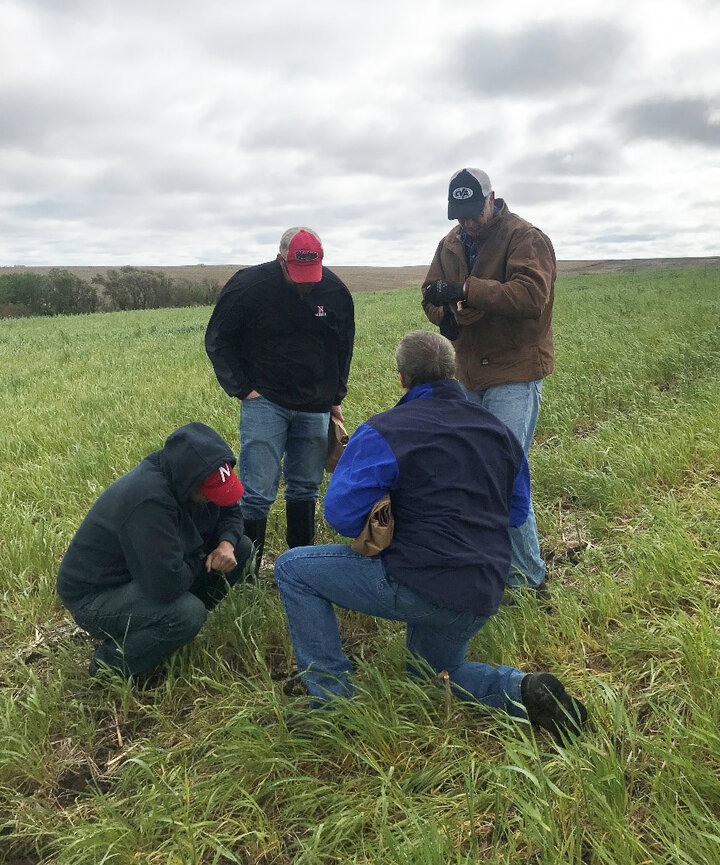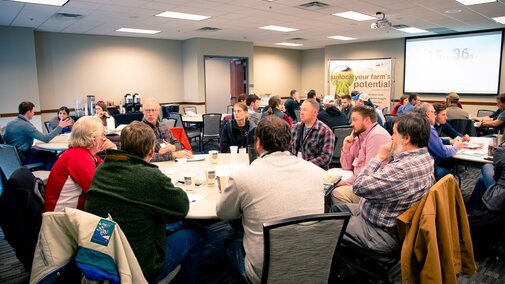Learn More in ...
- Farmers Find Solutions Through Soil Health Initiative
- Soil Health Initiative: Demonstrating Soil Health Management Across Nebraska
Early adopters of no-till practices in Nebraska have expressed increased interest in on-farm research focused on using cover crops, including more diverse mixes, and incorporating a third cash crop in the rotation. The Soil Health Initiative project is an on-farm research initiative that provides a way for growers to test and validate their production practices. It provides a way to make better-informed decisions based on what they learn from their field and nearby fields. This initiative also lowers the risks associated with changing farming methods, helping farmers explore how to be more profitable, sustainable, and resilient.
Producers Share Their Soil Health Stories
Earlier this year producers involved with the USDA Natural Resources Conservation Services (NRCS) Soil Health Demonstration Initiative met with University of Nebraska-Lincoln collaborators and NRCS staff. The producers shared experiences from the in-field management comparisons across the state designed to foster high-functioning farm ecosystems that promote soil health. The event also included talks on the basics of on-farm research, a summary of research reports, and group discussions.
The participants reported positive experiences from working on this collaborative research, including understanding the value of the partnership and interacting with other producers. Producers acknowledge the importance of this partnership and the value added by the project to their operation, service area, or region. They also indicated interest in extending the soil health management strategy past the five-year project contract. Using core regenerative agriculture principles and lessons learned from the Soil Health Demonstration Initiative, farmers and on-farm advisers can start to scale-up long-term on-farm research experiments and identify optimal cover crop management strategies for healthy soils.
How are UNL and NRCS Helping in the Progression toward Healthier Soils?
Implementing Soil Health Management Systems can lead to higher profits by fostering a healthy, fully functioning soil. However, getting to that point is a journey that involves a dose of innovation and practicality. When we talk about on-farm experiments, it is not easy to find a balance between scientific rigor and practical application. USDA and UNL are working with farmers to provide education on soil health systems to increase adoption of farm practices that contribute to this goal. This collaborative partnership has focused efforts that encompass three main approaches to interact with farmers and help them adopt soil health practices.
- Experiential. Farmers adapting their farm management to include soil health systems typically learn from practice. Collaborators typically wish to get an indication of improvements in profitability as well as measurable improvements in soil health and resiliency over time. After three years of activity, the results from the first demonstration field comparisons are being analyzed to identify early changes in the soil and management system.
- Technical. Reliable tests results, data analysis, interpretation, and communication efforts are essential for maintaining interest and engagement of project collaborators. Growers interested in viewing what other soil health demonstration farms have studied can view the research reports online in the searchable On-Farm Research Results Database.
- Social. Farmers have also learned from the social settings where they interact with other farmers and extension educators, sharing ideas and technical information. Creating a space for this transfer of information to occur is a key point for successful development of tools and approaches for on-farm experiments. Producers enrolled in the Soil Health Demonstration Farms and Ranch Initiatives host local field days. As network managers, UNL and NRCS also play an important role in bringing relevant information to the right people at the right time in the right place. On farm-research update meetings and field visits allow farmers, consultants, the ag industry, and university extension educators and conservation specialists to discuss research and results.

What Participants Shared
- “Spreading the word makes producers curious.”
- “Hope to see improvement in soil health, reduced erosion, and better water infiltration — to improve soil health as an investment in the future.”
- “By letting producers know what is new, the project is generating a lot of interest.”
- “[The project] demonstrated a successfully diversified rotation where the producer has proved that markets are available for these lesser-known cash crops. It is also a great demo for multispecies cover crop and the potential cover crops have.”
- “[This opportunity] gives real information and observation opportunities on my farm with less financial risk.”
- “When we have producers who are interested in starting cover crops/no-till, it is nice to have a place we can take them to show what can be accomplished.”
- “It was great to hear about all the other study topics across the state.”
To find out more about the Nebraska Soil Health Initiative, visit: https://cropwatch.unl.edu/soilhealth

